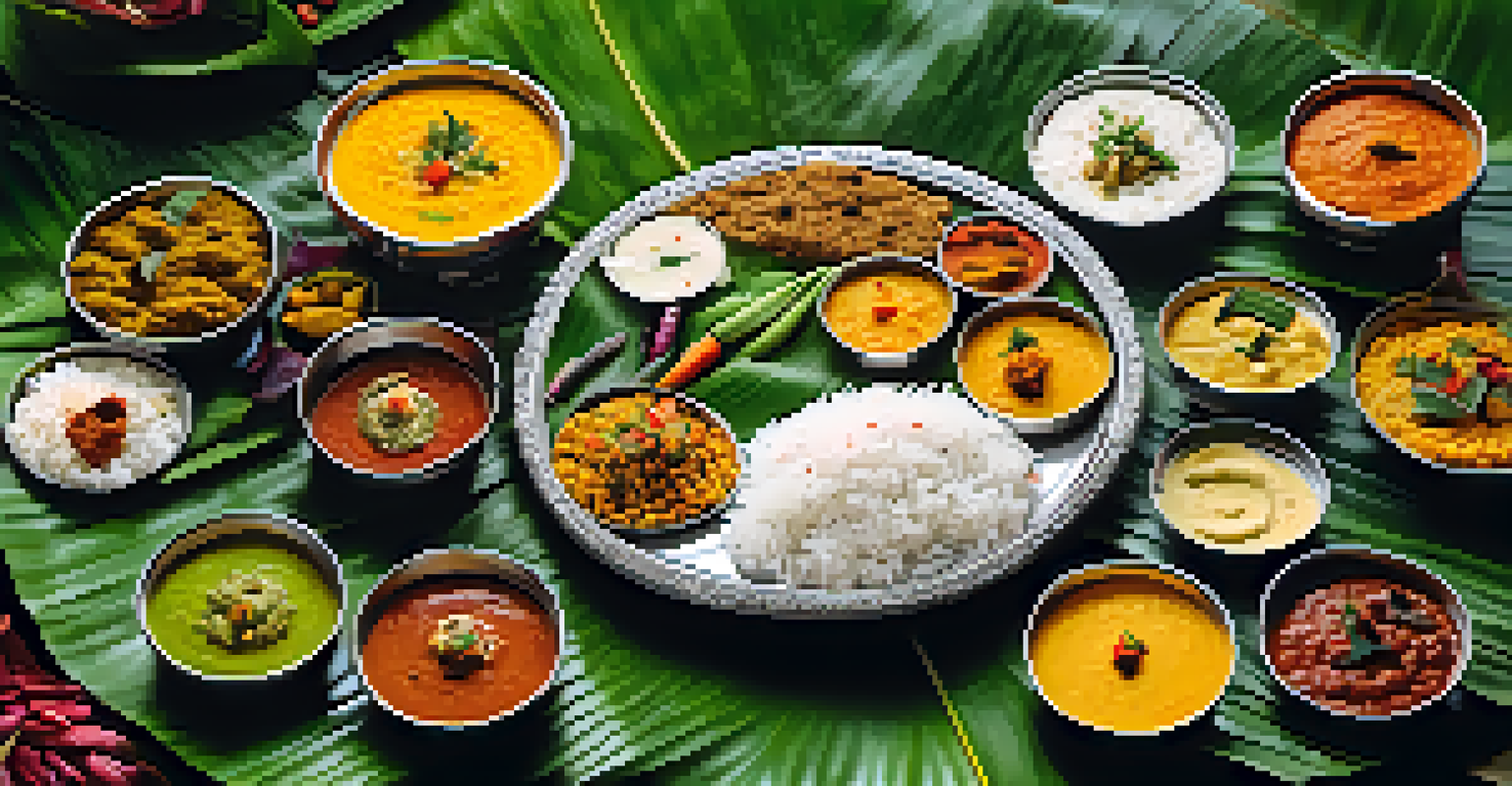Vegetarianism in India: A Culinary Tradition Rooted in Culture

The Historical Roots of Vegetarianism in India
Vegetarianism in India has deep historical roots, tracing back thousands of years. Influenced by religious beliefs, particularly Hinduism, Buddhism, and Jainism, many Indians have adopted a plant-based diet as a way to practice non-violence and respect for all living beings. This cultural practice is not just a dietary choice; it's a way of life that reflects the values and philosophies of these religions.
In every society, vegetarianism is a mark of the highest cultural development.
For instance, the concept of 'ahimsa' or non-violence, which is central to Jainism, encourages followers to avoid harming any living creatures. This principle has permeated Indian society, leading to a widespread acceptance of vegetarianism, especially in certain regions like Gujarat and Rajasthan. As a result, vegetarian food has become a cornerstone of Indian cuisine, with diverse flavors and textures that celebrate plant-based ingredients.
Moreover, historical texts and scriptures highlight the significance of vegetarianism in Indian culture. Ancient scriptures such as the Vedas and Upanishads often discuss the importance of a pure diet and its connection to spiritual growth. This rich heritage continues to influence contemporary practices, making vegetarianism a vital part of India's cultural identity.
Diversity of Vegetarian Cuisine Across Regions
India's vast landscape is reflected in its diverse vegetarian cuisine, with each region offering its unique flavors and dishes. From the spiced lentils of North India to the coconut-infused curries of the South, the variety is astonishing. This regional diversity showcases how local ingredients and cultural influences shape culinary practices, resulting in a rich tapestry of vegetarian dishes.

For example, in Punjab, you might enjoy a hearty plate of chole bhature, a spicy chickpea curry served with fluffy bread. In contrast, if you travel to Kerala, you could savor a traditional sadya, a feast featuring an array of vegetarian dishes served on a banana leaf. Each meal tells a story, reflecting the agricultural practices and cultural traditions of its region.
Historical Roots of Vegetarianism
Vegetarianism in India is deeply rooted in religious beliefs, particularly Hinduism, Buddhism, and Jainism, promoting non-violence and respect for all living beings.
This regional variation also highlights the adaptability of vegetarian cooking in India. As people migrate and cultures intermingle, new recipes emerge, blending traditional ingredients with innovative techniques. This ongoing evolution ensures that vegetarian cuisine remains vibrant and appealing, attracting food lovers from all backgrounds.
Cultural Significance of Vegetarianism in Festivals
In India, festivals are vibrant celebrations of culture and spirituality, and vegetarianism plays a crucial role in these occasions. Many festivals, such as Navratri and Pongal, emphasize vegetarian food as a means of devotion and purification. During these times, families come together to prepare and enjoy special vegetarian dishes, reinforcing bonds and sharing joy.
You are what you eat, so don't be fast, cheap, easy, or fake.
For instance, during Navratri, devotees fast and consume only vegetarian meals, often focusing on specific ingredients that are believed to possess spiritual significance. This practice not only honors religious traditions but also showcases the creativity of vegetarian cooking, with dishes like sabudana khichdi and kuttu ki puri taking center stage.
Moreover, the communal aspect of cooking and sharing vegetarian meals during festivals fosters a sense of unity and belonging. People from various backgrounds come together to celebrate, highlighting how food transcends cultural boundaries. This communal dining experience emphasizes the importance of vegetarianism as a shared value in Indian culture.
The Impact of Modernization on Vegetarian Practices
As India embraces modernization and globalization, the perception of vegetarianism is evolving. Urbanization has led to a surge in vegetarian restaurants and food brands catering to diverse tastes, making plant-based diets more accessible. This shift is not only about convenience but also reflects a growing awareness of health and environmental issues associated with meat consumption.
Younger generations are increasingly exploring vegetarian options, influenced by global trends and the rise of plant-based diets worldwide. Many are discovering the health benefits of vegetarianism, such as lower risks of chronic diseases and improved overall well-being. This awareness is prompting a culinary renaissance, where traditional vegetarian recipes are being reimagined with modern twists.
Diverse Regional Vegetarian Cuisine
India's vast landscape contributes to a rich variety of vegetarian dishes, each reflecting local ingredients and cultural practices.
However, this modernization also brings challenges, as traditional practices may be diluted or overlooked. Striking a balance between preserving cultural heritage and embracing new culinary trends is essential for maintaining the authenticity of vegetarianism in India. The ongoing dialogue around these issues reflects the dynamic nature of Indian cuisine.
The Role of Vegetarianism in Indian Health Culture
Vegetarianism is often viewed as a healthier lifestyle choice in India, with many people believing that a plant-based diet contributes to better health. Traditional Indian cuisine is rich in fruits, vegetables, legumes, and whole grains, providing essential nutrients and promoting overall well-being. The emphasis on spices, known for their medicinal properties, further enhances the health benefits of vegetarian meals.
For instance, turmeric, a common ingredient in Indian cooking, is celebrated for its anti-inflammatory properties, while ginger aids digestion. Such ingredients not only elevate the flavor of dishes but also align with the growing interest in holistic health practices. This connection between food and health has made vegetarianism an appealing option for many Indians.
Moreover, as awareness of lifestyle diseases increases, more individuals are turning to vegetarianism as a preventive measure. The shift towards healthier eating is evident in the growing popularity of vegetarian restaurants and health-focused food products. This trend reflects a broader understanding of the impact of diet on health, signifying a cultural shift towards wellness.
Influence of Celebrity Chefs on Vegetarian Trends
In recent years, celebrity chefs and food influencers have played a significant role in popularizing vegetarian cuisine in India. Their creative interpretations of traditional dishes and innovative recipes have captured the attention of food enthusiasts. By showcasing the versatility of vegetarian cooking, these chefs have made vegetarianism appealing to a wider audience.
For example, renowned chefs often incorporate local ingredients into their vegetarian dishes, elevating them to gourmet experiences. This not only highlights the richness of Indian agricultural produce but also encourages a new generation of cooks to explore vegetarian options. The result is an exciting culinary landscape where vegetarianism is seen as both trendy and delicious.
Modern Trends and Health Awareness
The rise of vegetarianism in contemporary India is driven by health consciousness and the influence of celebrity chefs, making plant-based diets more appealing.
Social media platforms further amplify this trend, allowing chefs to reach a global audience and inspire others to embrace vegetarian cooking. As more people share their vegetarian creations online, the movement gains momentum, fostering a sense of community among those who choose plant-based diets. This influence is reshaping perceptions of vegetarianism, making it a sought-after lifestyle choice.
Sustainability and Ethical Considerations in Vegetarianism
Vegetarianism in India is increasingly intertwined with discussions about sustainability and ethical eating. As concerns about climate change and animal welfare rise, many individuals are reevaluating their dietary choices. Vegetarianism is often seen as a more sustainable option, as it requires fewer resources and has a lower environmental impact compared to meat production.
This awareness is prompting a growing number of people to adopt vegetarian diets as a way to contribute to a healthier planet. The emphasis on local and seasonal produce not only supports farmers but also reduces carbon footprints associated with transportation. By choosing vegetarian options, individuals can play a part in promoting ecological balance and sustainability.

Additionally, the ethical considerations of animal welfare resonate deeply within the Indian cultural context. Many people choose vegetarianism as a compassionate response to the suffering of animals. This alignment of dietary choices with ethical beliefs further reinforces the significance of vegetarianism in Indian culture, making it a powerful movement towards a more conscious way of living.